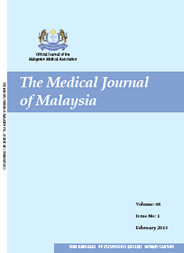MJM, Vol 70 Supplement 1 September 2015
Food poisoning outbreak in an integrated boarding
school Jasin, Malaysia, 2014
Malaysia EIP, Ministry of Health Malaysia
ABSTRACT
Introduction: Food poisoning occurs frequently in school. School children are a vulnerable group and outbreaks impact health and affect school performances. On 9th September 2014, Jasin Health Office was notified of students presenting with food poisoning. After verification by Rapid Assessment Team, a study was performed to describe the outbreak, identify risk factors, and implement control measures.
Methods: Case control study design was used. Cases were defined as staff or student presenting with either abdominal pain, nausea, vomiting or diarrhoea from 6th to 8th September 2014. Active case detection was conducted. Students were interviewed, stool from patients and food handlers were analysed. Environmental investigations included premise rating and surface sampling of used utensils. Hazard analysis of food preparation and sanitation inspection and multiple logistic regressions was used to identify the food implicated.
Results: Forty-five cases were identified with an attack rate of 7.9%. Cases were mostly female (51.1%). Main symptoms are abdominal pain (88.9%), nausea (75.6%) vomiting (68.9%) and diarrhoea (55.6%), and premises rating (79.3%). Hazard analysis showed inadequate defrosting of chicken, long holding time and insufficient cooking time. The exposure was most likely food consumed on evening of 5th September 2014. Implicated food chicken soup with rice. Multivariate logistic regression identified that chicken soup (OR=4.5, 95% CI: 1.6-12.4) was the likely food that caused the outbreak. Coliforms were detected in the chilly mixer and hands of food handler.
Conclusion: The food poisoning outbreak was most likely due to chicken soup with rice. Cross contamination is likely due to unsanitary food handling and poor personnel hygiene. Action taken included closure of premises and health education to food handlers. Practice concepts of ‘see, smell and taste’ may help prevent future outbreak and this is being strengthened.
Keywords: food poisoning, boarding school
